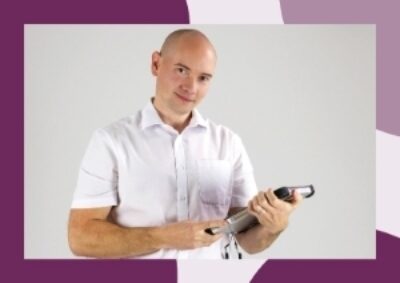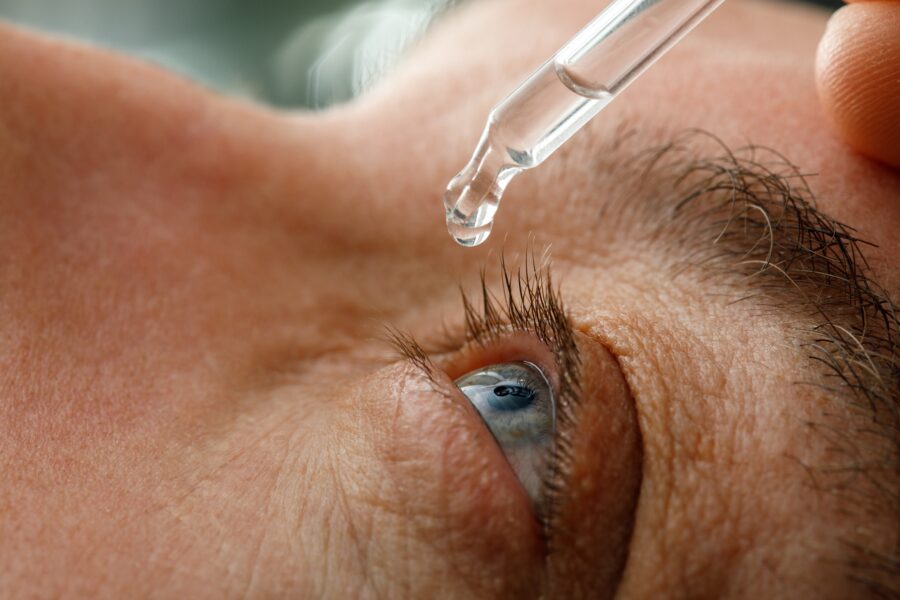Blog post
Hyperopia (long-sightedness): Signs, Symptoms and Treatments

Matthew Burford BSc(Hons) Optometry MCOptom - Domiciliary Optician and Professional Services Manager at OutsideClinic
4/5 minutes
What is hyperopia (long-sightedness)?
Hyperopia, also known as far-sightedness or long-sightedness, is a common refractive error where light rays from distant objects focus behind the retina. This often occurs due to a shorter eyeball or a flatter cornea.
As a result, close-up tasks such as reading or using a computer may appear blurred, while distant objects usually remain clearer because the eyes can compensate more easily at longer distances - depending on the degree of hyperopia. As we age, this compensation becomes harder, meaning many people become increasingly reliant on corrective lenses.
In contrast to myopia (short-sightedness), hyperopia arises from structural differences in the eye. Mild cases may only cause slight difficulty with close vision, while severe cases can affect both near and distant vision, often leading to eye strain and headaches.
It's important to note that hyperopia is different from presbyopia, as the two are often mistakenly confused. Presbyopia is an age-related condition.
What are the symptoms of hyperopia (long-sightedness)?
Hyperopia, or long-sightedness, can cause a variety of symptoms, especially during tasks requiring focus on nearby objects:
- Blurry vision with near objects: Difficulty focusing on close objects like books, phones or screens occurs because light is focused behind the retina instead of on it, making nearby objects appear blurry.
- Eye strain: Prolonged focus on nearby tasks may result in discomfort, fatigue and aching eyes.
- Squinting when reading: Squinting can temporarily improve focus but often leads to additional strain.
- Double vision: Close-up tasks may occasionally cause double vision, making it harder to concentrate.

What are the treatment options for hyperopia (long-sightedness)?
Since hyperopia is a refractive error, it can be treated or corrected with options such as:
Glasses:
- A simple and non-invasive solution that uses lenses to refocus light onto the retina, providing clear vision. Glasses are widely used for correcting both hyperopia and other refractive errors, offering a variety of styles to suit personal preferences.
Contact Lenses:
- These sit on the surface of the eye and correct refractive errors (such as hyperopia), and offer a wider field of view than glasses. Options include daily disposables, monthly lenses, rigid gas permeable (RGP) lenses for sharper vision and Ortho-K lenses worn overnight to temporarily reshape the cornea for daytime clarity.
Surgery:
- Laser procedures like LASIK (laser eye surgery) and PRK (photorefractive keratectomy) reshape the cornea to correct vision and address refractive errors. Each method has specific benefits depending on the severity of hyperopia and corneal health.
An eye care professional can help determine the most suitable option for your needs and lifestyle.

Can you prevent hyperopia (long-sightedness)?
While hyperopia can’t be prevented, there are some practical steps you can take to care for your eyes:
- Maintain a nutritious diet: Nutrients like vitamin A and vitamin C play a vital role in keeping your eyes healthy. Foods such as red peppers and squash are excellent sources. Explore more about the best foods for eye health.
- Schedule regular eye exams: Routine check-ups help detect vision changes early, update prescriptions, and monitor overall eye health.
- Protect your eyes: Environmental factors can pose risks to your eye health. Wear glasses with UV filters to shield your eyes from harmful sun rays and use protective eyewear for activities like DIY projects. Also restful sleep supports overall eye health and reduces fatigue, ensure you get adequate sleep each night. Discover more tips for maintaining healthy eyes.
Regular check-ups with an eye care professional ensure your vision remains clear and your eyes stay healthy.

What are the common questions about hyperopia (long-sightedness)?
Are there glasses available to help prevent hyperopia (long-sightedness)?
Yes, glasses are a great way to help alleviate the effects of hyperopia (long-sightedness) as they're non-invasive and will correct vision.
Can I wear long distance vision glasses all the time?
Yes, you can wear them all the time if they are comfortable and enhance your vision. Depending on your age and refractive error you may need additional help for closer work. For personalised advice, consult an eye care professional.
Does age cause hyperopia (long-sightedness)?
Refractive errors can change over time. However, with age, the lens of the eye loses its elasticity and becomes more rigid, reducing its ability to change shape. As a result, the lens struggles to thicken sufficiently to focus on close-up objects. This is known as presbyopia.

By Matthew Burford BSc(Hons) Optometry MCOptom - Domiciliary Optician and Professional Services Manager at OutsideClinic Post last updated 9th December 2025
Matthew graduated from Aston University in 2004 with a degree in Optometry.


